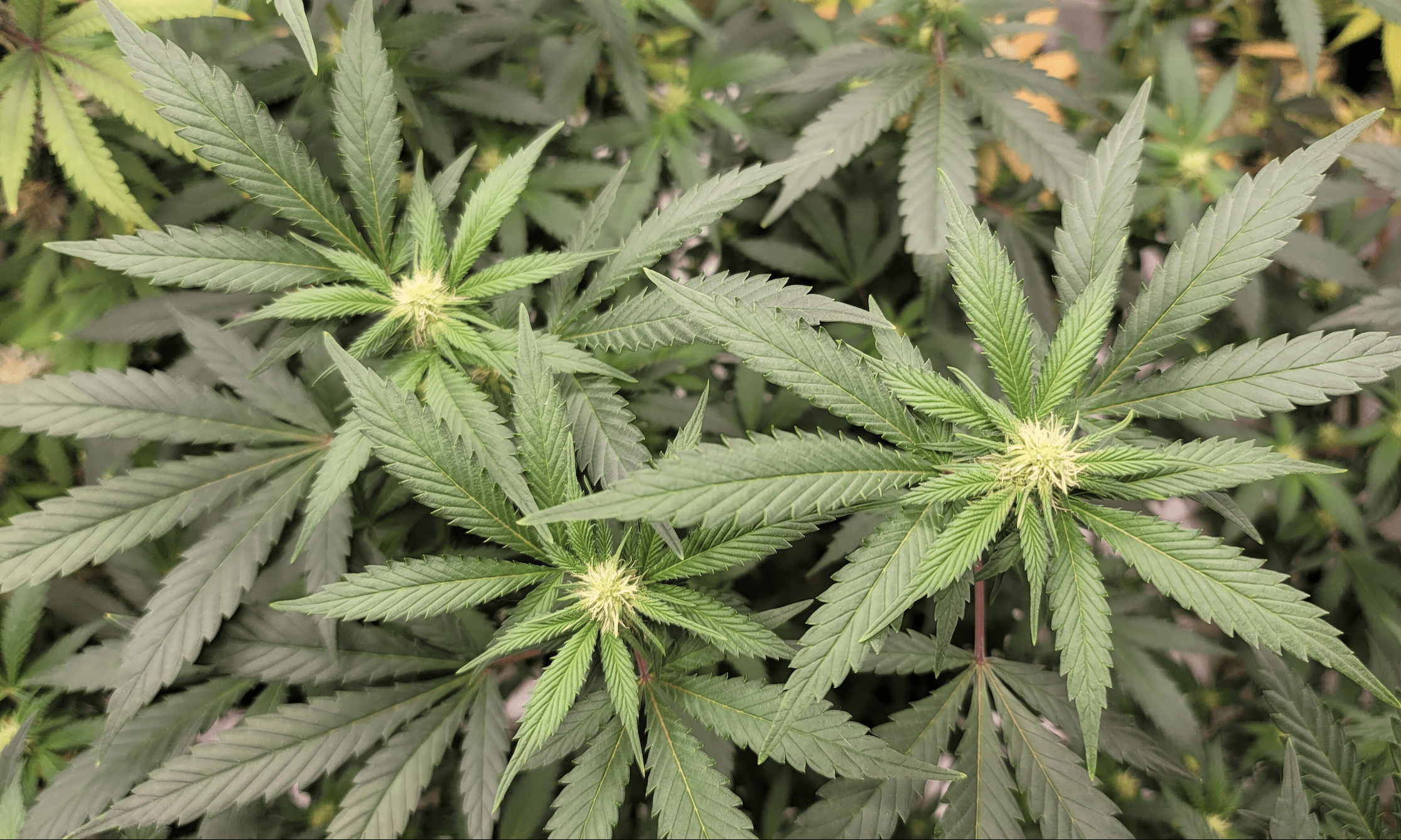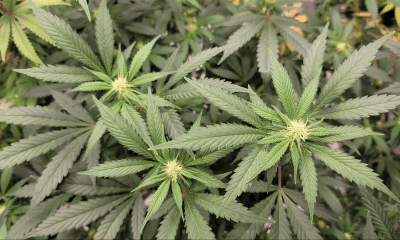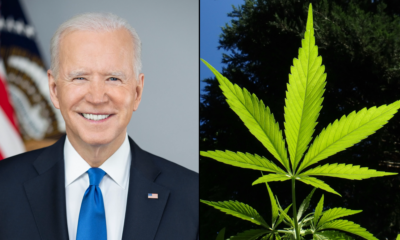Politics
Rhode Island Governor Supports Marijuana Expungements Despite Excluding Policy From His Legalization Plan

The governor of Rhode Island said on Friday that he supports allowing people to have their prior marijuana records expunged as part of an effort to legalize cannabis—even though that policy was not included in a reform proposal he recently introduced.
Gov. Daniel McKee (D) was also asked about his former opposition to legalization during an interview with WPRI-TV’s Newsmakers and said “the landscape has changed” on the issue, pointing out that states like neighboring Massachusetts have moved forward with ending cannabis prohibition.
Last week, McKee unveiled his budget proposal for the 2022 fiscal year that included language to legalize marijuana for adult use. It came days after legislative leaders introduced their own bill to tax and regulate cannabis sales. But unlike that measure, the governor’s plan did not explicitly call for clearing previous convictions.
McKee said he supports a separate expungement proposal from Rep. Anastasia Williams (D), and argued that it’s “one of the equity pieces” for cannabis reform. However, when asked for clarity on whether he would push for automatic record clearing or require people to petition the courts for the relief, the governor declined to state a view.
Watch the conversation about the governor’s marijuana policy proposal, around 19:05 into the video below:
“Either way is fine with me,” he said. “I mean, I think that they just need a path towards that if in fact it’s no longer a crime today than it was then—that shouldn’t be part of their record.”
McKee was pressed on the fact that not too long ago he was on the record opposing adult-use legalization. The governor said regional policy changes have influenced his reversal, noting that Massachusetts has enacted a legal marijuana market and “we certainly can learn from that.”
“We’re reflecting in the bill that we propose strong regulation—really good oversight—making sure that some of the dollars go into some of the areas that have to do with health and addiction issues,” he said, adding that his plan would give “opportunity to minority business owners, and we prioritize them so that 20 percent of the applications that go in, we approve through minority business,” he said.
“There’s economic opportunity there—and as long as long as we are being competitive with our neighbors, I think that’s certainly a piece,” the governor said. “But I think that what you just talked about, the fact that there is a need to expunge records, there is a need to make sure that we’re not penalizing people long-term, and that’s happening.”
He went on to say that the conversations going on about how best to institute legalization are “a sign of the times.” That said, “there’s a lot of decisions that you’re going to make that are not 100 percent one way or the other—there’s gray areas.”
McKee also spoke about the differences between his new plan and that of former Gov. Gina Raimondo (D), who has proposed a system of state-run marijuana stores in her most recent budget.
“I think that we have put a very good bill together, making it an entrepreneurial,” the current governor said. “Last year was more or less to have a state, New Hampshire plan, right, which was going to be more state-held. We got 85 or so cultivators that have invested dollars in their businesses, so we want to make sure that they have an opportunity to make it if they can. The entrepreneurship is a big piece of what we put forward and it’s a big change to what Gov. Raimondo had put forward.”
While there are a number of differences between the legalization proposals introduced by the new administration and lawmakers, both sides have signaled that they intend to work together as they move through the process. But there’s generally agreement that reform should prioritize entrepreneurship and the market should be privatized, rather than run by the state as Raimondo called for before joining the Biden administration as commerce secretary.
McKee’s proposal calls for 25 marijuana retailers to be licensed each year for the first three years of implementation. Those would be awarded on a lottery basis, but five would be specifically given to minority-owned businesses, a category that also includes firms run by women. Additional licenses would be issued in the future based on demand. Sales would begin in April 2022.
The plan calls for a “strictly regulated legal market for adult-use marijuana” that is “anchored in principles of equity and public health and safety,” an executive summary of the budget proposal says.
—
Marijuana Moment is already tracking more than 900 cannabis, psychedelics and drug policy bills in state legislatures and Congress this year. Patreon supporters pledging at least $25/month get access to our interactive maps, charts and hearing calendar so they don’t miss any developments.
![]()
Learn more about our marijuana bill tracker and become a supporter on Patreon to get access.
—
Cannabis sales would be taxed at 17 percent, which includes the state’s seven percent sales tax and a special excise tax of 10 percent. An administration official said on Thursday that a wholesale tax would also be applied and they estimate it would amount to three percent. The governor also included a call to create a “weight-based excise tax on marijuana cultivation.”
That’s similar to the tax plan put forward by Senate Majority Leader Michael McCaffrey (D) and Health & Human Services Chairman Joshua Miller (D), though their measure calls for concrete 20 percent tax that includes the 10 percent special tax, seven percent sales tax and a three percent tax for jurisdictions that allow cannabis firms to operate in their area.
According to a fiscal analysis of the governor’s plan, the state stands to generate $1.7 million in marijuana tax revenue in the 2022 fiscal year, rising to $16.9 million in 2023.
Sixty percent of tax revenue would go to the state general fund, 25 percent would cover administrative costs—as well as “public health and public safety costs associated with adult-use marijuana”—and the remaining 15 percent would go to local governments. However, for the first year of implementation, 70 percent of revenue would fund the administrative and regulatory costs.
Both plans allow adults 21 and older to purchase and possess up to one ounce of marijuana. However, only the lawmakers’ bill provides a home grow option, with the governor’s stipulating a series of fines and penalties for personal cultivation of any number of plants.
In terms of social equity, the governor’s proposal would establish a “Cannabis Reinvestment Task Force,” tasked with studying and making recommendations on the most effective way to allocate tax revenue to support programs “in the specific areas of job training, access to capital for small businesses, affordable housing, health equity and community development.”
The competing Senate bill would similarly create an equity fund from license and application fees to provide “technical assistance and grants” to promote industry participation from “disproportionately impacted areas.” It does not contain provisions giving licensing priority to equity applicants, however.
McKee gave initial insights into his perspective on the reform in January, saying that “it’s time that [legalization] happens” and that he’s “more leaning towards an entrepreneurial strategy there to let that roll that way.”
House Speaker Joseph Shekarchi (D), meanwhile, has said he’s “absolutely” open to the idea of cannabis legalization but also leans toward privatization.
Late last year, the Senate Finance Committee began preliminary consideration of legalization in preparation for the 2021 session, with lawmakers generally accepting the reform as an inevitability. “I certainly do think we’ll act on the issue, whether it’s more private or more state,” Sen. Ryan Pearson (D) said at the time.
The growing momentum in Rhode Island also comes as lawmakers in neighboring Connecticut are also moving toward legalizing marijuana this year. Gov. Ned Lamont (D) included a cannabis legalization plan in his budget request last month, though advocates have been critical of several provisions, particularly as they concern social equity and home cultivation.
Meanwhile in Rhode Island, the Senate approved a bill last month that would allow safe consumption sites where people could use illicit drugs under medical supervision and receive resources to enter treatment. Harm reduction advocates say this would prevent overdose deaths and help de-stigmatize substance misuse.
Lawmakers also filed a separate bill to decriminalize possession of all drugs.
Cuomo Caves On Marijuana Homegrow And Equity Funding, Top New York Senator Signals
Photo courtesy of Mike Latimer.
















